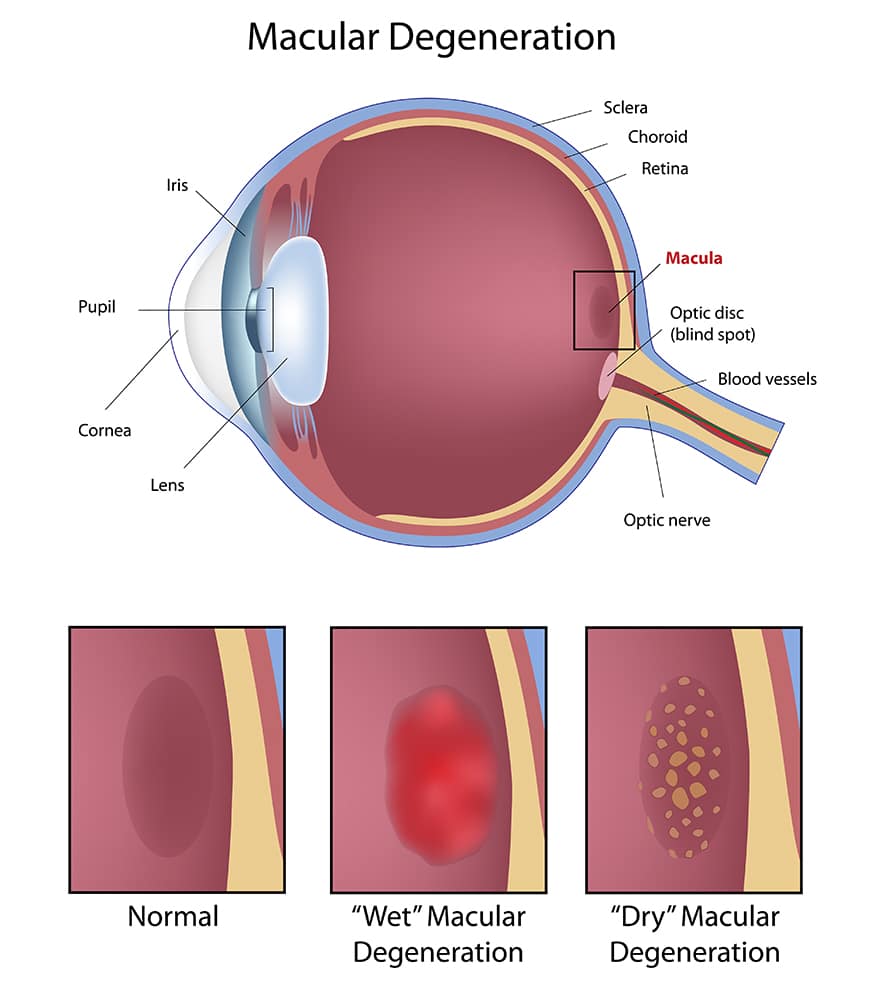Macular degeneration, also known as age-related macular degeneration (AMD), is a leading cause of vision loss in individuals aged 50 and older. This progressive condition affects the macula, the central portion of the retina responsible for sharp, detailed vision required for tasks such as reading and driving.
Types Of Macular Degeneration
Macular degeneration is classified into two primary types:
-
Dry (Non-Neovascular) AMD
This is the most common form and is considered an early stage of the disease. It typically develops as the macular tissue thins with age, often accompanied by the accumulation of pigment deposits known as drusen. -
Wet (Neovascular) AMD
Found in approximately 10% of cases, this advanced form involves the growth of abnormal blood vessels beneath the macula. These vessels may leak blood or fluid, leading to scarring and rapid deterioration of central vision.

Importantly, peripheral (side) vision is typically preserved in both forms of AMD.
Risk Factors For Macular Degeneration
While age is the most significant risk factor, several other genetic and environmental elements can increase susceptibility, including:
-
Genetic predisposition (e.g., complement factor H variant)
-
Family history of AMD
-
Female gender
-
Light-colored eyes or skin
-
Age over 75
-
Smoking
-
Obesity
-
High-fat diet
-
Elevated cholesterol
-
Prolonged sun exposure
-
High blood pressure
-
Use of certain medications
To reduce the risk of developing AMD, patients are encouraged to maintain a healthy lifestyle by:
-
-
Eating a diet rich in Omega-3 fatty acids
-
Exercising regularly
-
Avoiding smoking
-
Protecting their eyes from excessive sunlight
-
Attending routine eye examinations
-
Symptoms Of Macular Degeneration
Patients with dry macular degeneration may notice gradual changes to their vision, including:

-
Dry AMD may cause gradual visual changes such as:
-
Blurred or distorted central vision
-
Difficulty reading or recognizing faces
-
Reduced color perception
-
Shadows or blind spots in central vision
Wet AMD can progress quickly and lead to:
-
Straight lines appearing wavy or crooked
-
Sudden loss of central vision
-
Larger, more pronounced blind spots
Although central vision is impacted, most patients retain enough peripheral vision to remain independent.
-
Diagnosis Of Macular Degeneration
Early detection is critical in managing AMD effectively. During a comprehensive eye exam, ophthalmologists may detect early signs of the disease—even before symptoms appear. Diagnostic tools include:
-
Dilated eye exams
-
Amsler grid testing to detect visual distortion
-
Optical coherence tomography (OCT) and fluorescein angiography for detailed retinal imaging
Treatment Of Macular Degeneration
Although there is currently no definitive cure for macular degeneration, a variety of effective treatment options are available to help patients manage the condition and preserve remaining vision. The most appropriate treatment approach depends on several factors, including the type of macular degeneration, its severity, and the extent of any permanent vision loss.
Wet Macular Degeneration Treatments
-
Anti-VEGF Injections:
Intraocular injections of anti-vascular endothelial growth factor (VEGF) medications are a widely used treatment for wet macular degeneration. These medications inhibit the growth of abnormal blood vessels beneath the retina. Administered directly into the vitreous of the eye, typically on a monthly basis, they can significantly reduce fluid leakage and help stabilize or improve vision. -
Photodynamic Therapy:
This treatment involves the use of a light-activated drug to target and eliminate abnormal blood vessels. It can be especially beneficial in certain cases of wet AMD where other treatments may be less effective.
Dry Macular Degeneration Support
-
Nutritional Supplements (AREDS/AREDS2 Formulation):
Patients with dry macular degeneration may benefit from high-dose vitamins and minerals, which have been shown to slow disease progression in individuals with intermediate or advanced stages of AMD. These supplements may help reduce oxidative stress and support retinal health.

